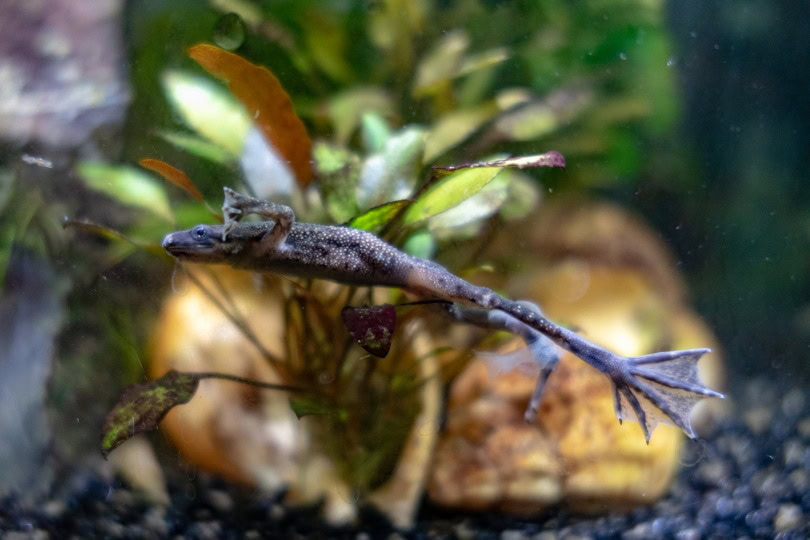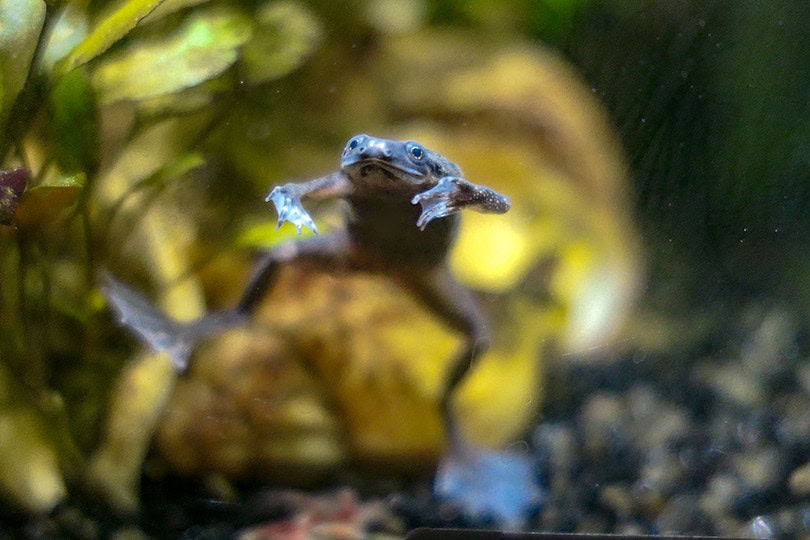First discovered in equatorial Africa in 1896, the aquatic African dwarf frog didn’t start becoming popular in the pet trade until the 1970s. They have become increasingly popular as pets due to their low maintenance care requirements.
African dwarf frogs are small, weighing only a few ounces and reaching only 3 inches in length. Their life expectancy is usually between 3-10 years, with the average of about 5 years. Even though they are omnivores, African dwarf frogs prefer a more meat-based diet. There are a lot of pellet-based foods available to take care of their diet needs.
These little amphibians spend their entire lives in the water and only come up to the surface to breathe. These frogs cannot spend a lot of time out of the water because they will dehydrate and die in just a short amount of time.

Diet of a Wild African Dwarf Frog

During Africa’s dry seasons, they are found in the shallows of rivers, creeks, and ponds. They also inhabit the flooded areas of forest during the wet seasons. African dwarf frogs are omnivorous scavengers. In the wild they will eat anything living, dying, or dead. They feast on organic matter produced by the decomposition of other organisms.
African dwarf frogs have what is called a hyobranchial pump that is designed to draw food into their mouths. They use their webbed feet to shove food in their mouths and down their throats.
They can sense movements and vibration in the water with their unique later line system. Their tiny but powerful legs are used for swimming and lunging after food. They have claws on their feet that are used to tear apart pieces of larger food.
Tiny, sensitive fingers, a keen sense of smell, and their lateral line system are used in conjunction to help the African dwarf frog find food.
Diet and Feeding of a Pet African Dwarf Frog

African dwarf frogs are a pet that is to be seen and not handled. They are fragile little creatures that can make a great addition to your aquarium. You will want to research the best types of tank mates suitable to share habitat with the frogs.
African dwarf frogs will eat off the bottom of the aquarium. Since they don’t have teeth they are required to swallow their food whole. For this reason, you must ensure that your frog’s food is of appropriate size.
As scavengers, African dwarf frogs will eat a variety of food.
- See Also: African Bullfrog
- Brine shrimp
- Bloodworms
- Krill
- Pieces of worms
- Small live fish
- Commercial frog foods
Though they are omnivores, African dwarf frogs prefer a more meat-based diet. There are a variety of pellet-based foods available that will envelope the basis of their diet. If you choose the pellet-based diet, you can always opt to give them the occasional earthworm, brine shrimp, or bloodworm as a treat. You have the option feed them live or frozen food, most of their food preferences can be found frozen or live.
Young African dwarf frogs should be fed once a day, as they age, they can be fed once every two days. Try not to overfeed your frogs, this can lead to obesity. It is vital to feed them appropriately sized bites of food and to only feed them what they can easily consume within 10–20 minutes. Any food left uneaten will need to be removed from the tank.

Conclusion
We hope this article sheds some light on the diet of African dwarf frogs. If you own one or are planning on getting one, you want to make sure that you provide them with the best diet. Or perhaps you are just interested in learning about this wild frog’s diet. Either way, share what you learned from this article with your family and friends.
- Related Read: African Dwarf Frogs for Sale: Breeders List
Featured Image Credit: Charlie Tyack, Shutterstock










